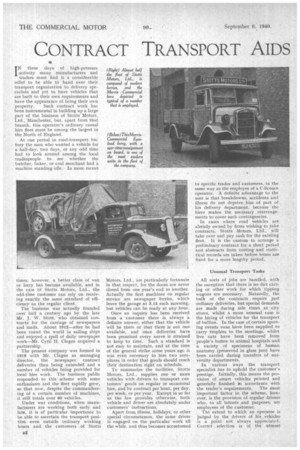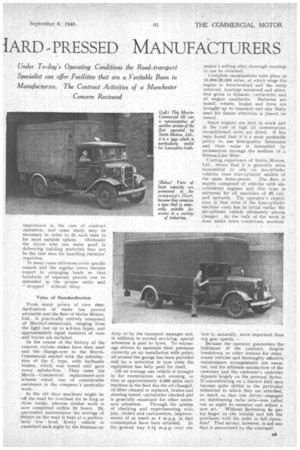CONTRACT TRANSPORT AIDS IARD PRESSED MANUFATURERS
Page 20

Page 21

If you've noticed an error in this article please click here to report it so we can fix it.
IN these days of high-pressure activity many manufacturers and traders must find it a considerable relief to be able to hand over their transport organization to delivery specialists and yet to have vehicles that are built to their own requirements and have the appearance of being their own
property. Such contract work has been instrumental in building up a large part of the business of Stotts Motors, Ltd., Manchester, but, apart from that branch, this operator's ordinary casu0 hire fleet must he among the largest it the North of England.
At one period in road-transport his tory the man who wanted a vehicle for a half-day, two days, or any add time had to look around among the local tradespeople to see whether th butcher, baker, or coal merchant had machine standing idle. In more recen times, however, a better class of va or lorry has become available, and ' the case bf Stotts Motors, Ltd., t e odd-time customer can rely on recei ing exactly. the same standard of e ciency as the regular client.
The business was actually founded over half a century ago by the late Mr. J. W. Stott, who obtained contracts for the carriage of newspapers and mails. About 1912—after he had been round the world in sailing ships and enjoyed a spell of daily newspaper work—Mr. Cyril H. Clague acquired a partnership.
The present company was formed in 1919 with Mr. Clague as managing director, the newspaper contract deliveries then being extended and a number of vehicles being provided for local hire work. The business public responded to this scheme with some enthusiasm and the fleet rapidly grew, so that now, despite the commandeering of a certain number of machines, it still totals over 60 vehicles.
'.Under war conditions, when manufacturers are working both early and late, it is of particular importance to be able to ascertain the transport positicrn even outside ordinary working hours and the customers of Stotts Motors, Ltd., are particularly fortunate in that respect, for the doors are never closed from one year's end to another. Actually the first machines on regular service are newspaper lorries, which leave the garage at 3.15 each morning, but vehicles can be ready at any hour.
Once an inquiry has been received from a customer there is. always a definite answer, either that the vehicle will be there or that there is not one available, and once deliveries have been promised every nerve is strained to keep to time. Such a standard is not easy to maintain, and at the time of the general strike some years ago it was even necessary to hire two aeroplanes in order that goods should reach their destination right on schedule.
To summarize the facilities, Stotts Motors, Ltd., supplies one or more vehicles with drivers to transport customers' goods on regular or occasional hire, and by contract per hour, per day, per week, or per year. Except in so far as the law provides otherwise, both vehicle and driver are absolutely under customers' instructions.
Apart from illness, holidays, or other special circumstances, the same driver is engaged on the particular work all the while, and thus becomes accustomed to specific trades and customers, in the same way as the employee of a C-licence operator. A definite advantage to the user is that breakdowns, accidents and illness do not deprive him of part of his delivery department, because the hirer makes the nece,ssary rearrangements to cover such contingencies.
In cases where road vehicles are already owned by firms wishing to take contracts, Stotts Motors, Ltd., will take over and pay cash for the existing fleet. It is the custom to arrange a preliminary contract for a short period and abstracts from costing and statistical records are taken before terms are fixed for a more lengthy period.
Unusual Transport Tasks
All sorts of jobs are handled, with the exception that there is no dirt carting or other work for which tipping wagons are necessary. Naturally, the bulk of the contracts require just ordinary deliveries, but special demands are made during sale times at 'City stores, whilst a more unusual case is the hiring of vehicles for the transport of bullion. In the case of certain sporting events vans have been supplied to carry trophies to the meetings, whilst live cats have been removed from people's horees to animal hospitals and a variety of specimens of human anatomy (preserved in glass jars) have been carried during transfers of university departments.
In various ways the transport specialist has to uphold the customer's prestige. Initially, this means the provision of smart vehicles painted and generally finished in accordance with the trader's requirements. The most important factor in the scheme, however, is the provision of regular drivers who, to all intents and purposes, are employees of the customer.
The extent to which an operator is judged by the drivers of his .vehicles is a point not always appreciated. Correct selection is of the utmost
importance in the case of contract operation, and some study may be necessary in order to fit each man to his most suitable sphere. Obviously the driver who can make good in delivering building materials may not be the best man for handling chemists' requisites.
In many cases deliveries cover specific rounds and the regular crews become expert in arrangingloads so that hundreds of separate parcels can he unloaded in the proper order and "dropped " without delay.
Value of Standardization From many points of view standardization of make has proved advisable and the fleet of Stotts Motors, Ltd., is practically entirely composed of Morris-Commercials, ranging from the light van up to 4-5-ton types, and approximately equal numbers of vans and lorries are included, In the course of the history of the concern various makes have been used and the change-over to the MorrisCommercial started with the introduction of the C type, with hydraulic brakes, which was tested and gave every satisfaction. Then came the ,Morris Commercial replacement-unit scheme which was of considerable assistance in the company's particular work.
In the old days machines might be off the road for overhaul for as long as three weeks, whereas similar work is now completed within 24 hours. By preventive maintenance the average of delays on the road is kept at a particularly low level. Every vehicle is examined each night by the foreman on duty or by the transport manager and. in addition to normal servicing, special attention is paid to tyres. To encourage drivers to maintain their pressures correctly an air installation with points all around the garage has been provided and by a reduction in tyre costs the equipment has fully paid for itself.
.On an average one vehicle is brought in for examination each evening, so that at approximately 5,000 miles each machine in the fleet has the oil changed, oil filter cleaned or replaced, brakes and steering tested, carburetter checked and is generally examined for other neces sary attention. Through the system of checking and experimenting with jets, chokes and ca,rburetters, improvements of as much as 4 m.p.g. in fuel consumption have been attained. In the general way I-11 m.p.g. over the maker's setting after thorough running. in can be obtained.
Complete examinations take place at 15,000-20,000 miles, at which stage the engine is decarbonized and the sump removed, bearings examined and attention given to dynamo, carburetter and all engine auxiliaries. Batteries are tested, wheels, brakes and tyres are brought up to standard and any likely need for future attention is placed on record.
Spare. engines are held in stock and in the case of high oil consumption reconditioned units are fitted. It has been found that it is a most profitable policy to use first-quality lubricants and their value is intensified by reclamation through the medium of a Stream-Line filter.
Costing experience of Stotts Motons, Ltd., shows that it is generally more economical to rely on six-cylinder vehicles than Jour-cylinder models of
the same horse-power. The fleet is mainly composed of vehicles with sixcylindered engines and this type is universal for all machines of 30 cwt. and upwards. The operator's experience is that even if the four-cylinder machine costs less in initial outlay the six-cylinder vehicle ultimately proves cheaper. As the bulk of the work is done under town conditions, accelera
tion is, naturally, more important than top gear speeds. • .
Because the operator guarantees the fulfilment Of the contract, despite breakdown or other reasons for delay, sound vehicles and thoroughly effective maintenance arrangements are essential, but the ultimate satisfaction of the customer and the customer's customer depends largely on the personal factor. If concentrating on a limited field men become quite skilled in the particular industries to which they are attached, so much so that one driver—engaged on distributing radio sets—was called out at night to examine and adjust a new set. Without hesitation he put his finger on the trouble and left the purchaser with his radio in full operation! That service, however, is not one that is guaranteed by the contract!




















































